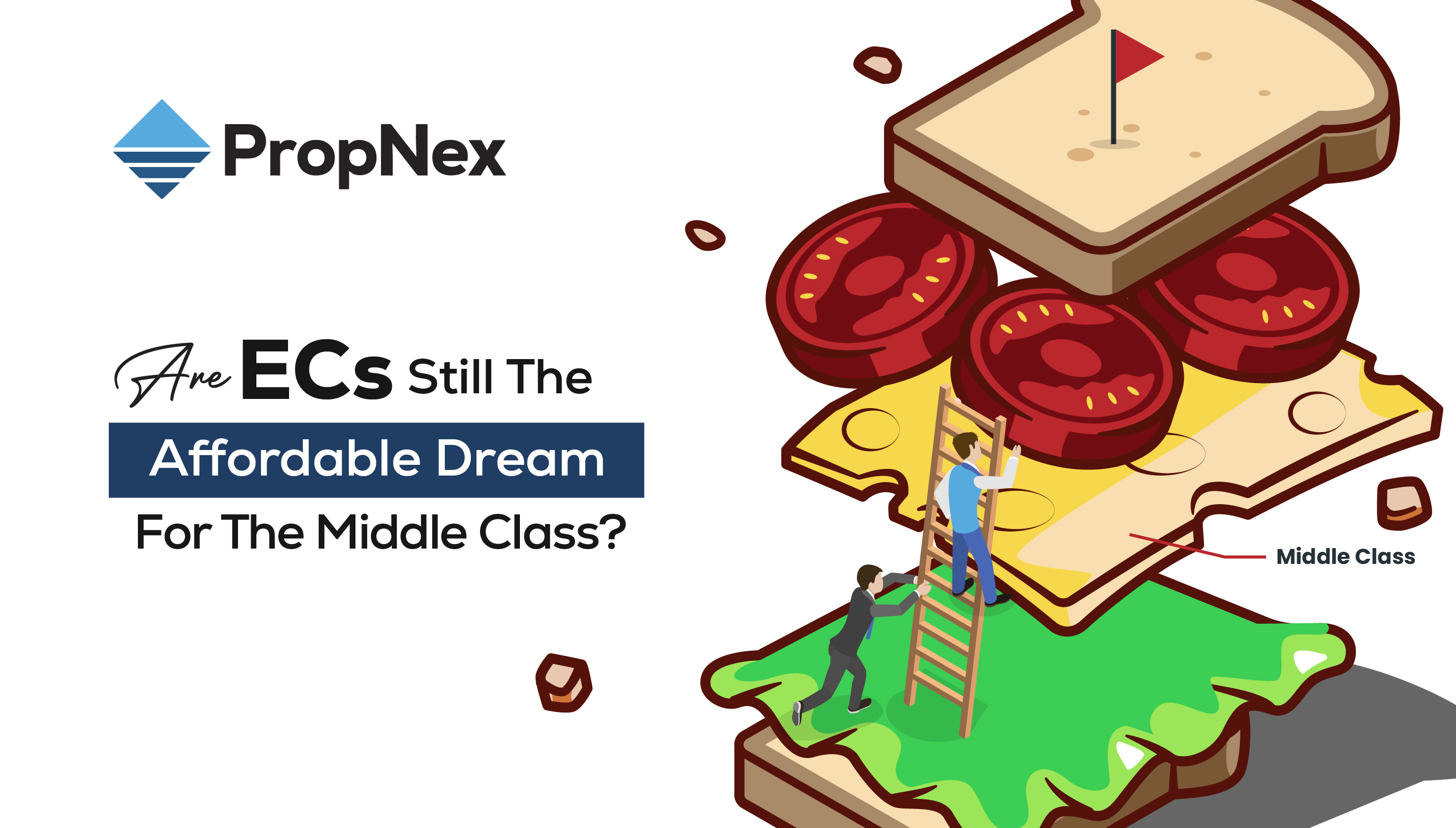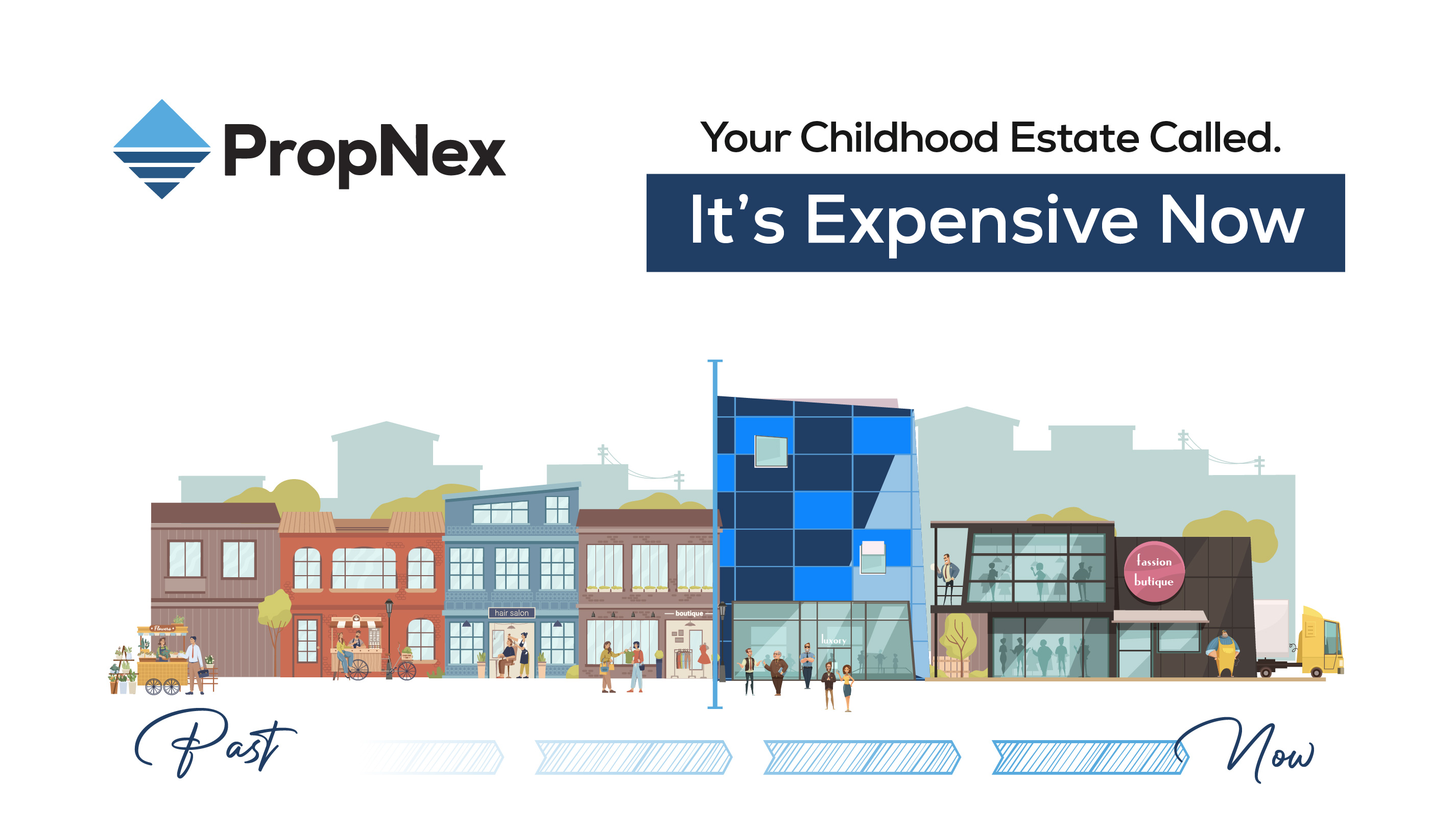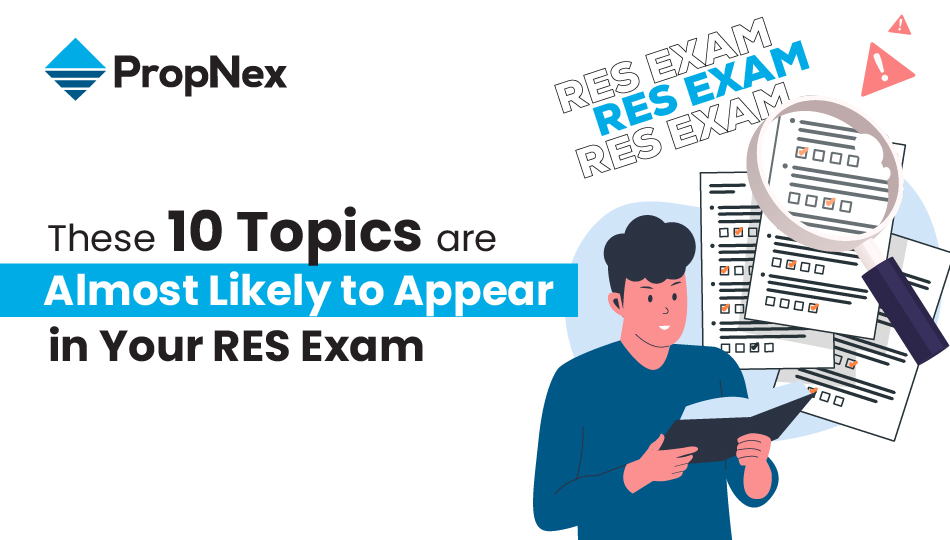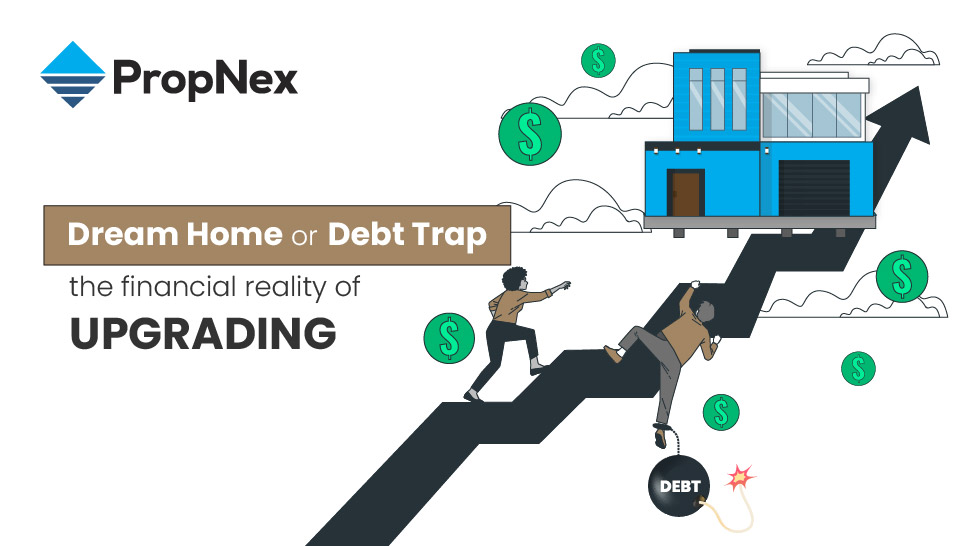PropNex Picks
|June 10,2025Are ECs Still The Affordable Dream For The Middle Class?
Share this article:
Executive Condominiums (ECs) have long been the sweet spot for Singapore's sandwiched class - those earning too much for a BTO flat, yet not quite enough to comfortably afford a private condo. ECs were introduced as a stepping stone: offering condo-style living at a subsidised price.
But in recent times, that "sweet spot" is starting to feel like a stretch. With income ceilings not keeping pace, more middle-income families are finding themselves edged out of a scheme designed for them.
So, are the ECs still the affordable dream for the middle class - or has that dream quietly slipped out of reach? Let's unpack reality.
When ECs were first introduced in 1996, they were positioned as a hybrid housing option - a bridge between public and private housing. Targeted at the sandwiched class, ECs were meant to offer a taste of condo living, without the full weight of private property prices.
These developments are built by private developers, but they come with conditions: an income ceiling, eligibility criteria, and a minimum occupation period (MOP) of five years. In return, buyers enjoy lower entry prices compared to private condos, along with potential CPF Housing Grants. After 10 years, ECs are fully privatised and can be sold to foreigners - often fetching prices on par with private developments.
The original intent was clear: give middle-income Singaporeans a chance to upgrade without overstretching their finances. But with current price trends and tightened financing rules, we now have to ask - is the EC still fulfilling its original purpose?
Trend of new 3-bedroom ECs from 1996-present
If ECs were once the affordable middle ground, their 2025 price tags suggest otherwise. Launch prices for new EC projects have climbed sharply - with some developments seeing 3-bedroom units starting from $1.5 million or more. There's a stark jump from just a decade ago, where similar units could be secured for under $900,000.
Psf of new ECs from 2014-present
On a per square foot (PSF) basis, the average price of ECs has more than doubled since 2014 - rising from around $800 psf to over $1,700 psf in recent launches. And the pace of increase has been anything but gradual. In fact, just in the past year, prices shot up by 13% - a reflection of higher land costs, construction inflation, and developers having to factor in tighter profit margins amid rising development costs.
Project (Launch year) | Launch day psf (Average) | Launch day price (Average) |
Aurelle of Tampines (2025) | $1,768 | $1,551,138 |
Novo Place (2024) | $1,652 | $1,483,839 |
Lumina Grand (2023) | $1,520 | $1,482,338 |
North Gaia (2022) | $1,294 | $1,329,491 |
Parc Greenwich (2021) | $1,223 | $1,263,872 |
Parc Central Residences (2020) | $1,164 | $1,137,338 |
3-bedroom units in recent ECs launches
It's not just one or two projects either. With a growing number of units now carrying price tags that mirror those of mass-market condos in the OCR, buyers are beginning to question whether ECs still offer a meaningful discount - or if the lines between "executive" and "private" are blurring.
Source: The Straits Times
The issue isn't just that EC prices have risen, but incomes have not kept up. While the income ceiling for EC eligibility is currently capped at a monthly household income of $16,000, most buyers fall below the threshold. And even if they do, it doesn't guarantee they can comfortably afford the units available.
Under the Mortgage Servicing Ratio (MSR), which limits loan repayments to 30% of household income, a couple earning the full $16,000 a month can typically borrow around $910,000. But when EC prices start from $1.4 million, that leaves a significant financing gap of $400,000 to $500,000.
Even after tapping into CPF savings and housing grants - such as the Family Grant or the Half-Housing Grant - many buyers still find themselves short. The result? More middle-income households are having to either downsize their expectations, dip into more of their savings, or walk away altogether.
The numbers speak for themselves: what used to be a clear pathway to homeownership now feels like an uphill climb. And for those earning closer to $11,000 - the median monthly household income in 2024 - the gap is even wider, making the dream of owning an EC feel increasingly out of reach.
These affordability challenges are precisely why financial literacy - and frameworks like the Property Wealth System (PWS) - are more vital than ever. The PWS framework not only was designed to guide buyers to assess their affordability of a property today, but how each purchase contributes to a larger wealth strategy. For many, the right EC isn't just a home - it's a springboard to future financial stability.
The squeeze on affordability is triggering a bigger concern: is the middle class slowly being pushed out of a scheme designed for them? ECs were meant to uplift this segment - but in today's context, they're starting to feel exclusive rather than inclusive.
For many sandwiched class families, the frustration is palpable. They earn well, save diligently, and aspire to upgrade - only to find that even ECs require a level of financial stretching they're uncomfortable with. The irony? Some private condos offer similar or slightly higher prices, but with fewer restrictions.
The emotional toll is real. What was once a clear progression - HDB to EC to private - now seems more like a blurred path full of detours. Without intervention, we risk turning ECs into a product that primarily serves the upper-middle class, leaving behind the very group that was intended to benefit.
When ECs are priced just 10-15% below comparable OCR private condos, buyers start to question the value proposition. Yes, ECs offer subsidies and potential capital appreciation post-MOP - but those perks are weighed against limitations: income ceilings, eligibility rules, and the 5-year MOP.
Meanwhile, mass-market condos may come with immediate rental flexibility, no MOP, and access to similar facilities. In some cases, they are even located closer to MRT stations or commercial hubs.
New ECs vs New Launch Condos in OCR
As of writing, recent data shows that the average PSF for new ECs has climbed from $403 psf in 1996 to $1,725 psf in 2025 - a jump of 328.04%. In contrast, new launch OCR condos rose from $684 to $2,341 psf over the same period, marking a 242.25% increase. While ECs have appreciated strongly, the narrowing PSF gap raises the question: is the remaining price difference enough to justify the tighter restrictions and eligibility conditions?
If the price difference isn't significant enough, the benefits of going for a "true" private condo - even a smaller unit - may outweigh the restricted freedom of an EC. It's a decision more buyers are starting to make.
From infinity pools to smart home systems, ECs today are virtually indistinguishable from private condos in terms of amenities. Top developers are bringing in branded fittings, co-working lounges, and even concierge services.
This upgrade in lifestyle features has helped drive demand, but it's also nudged prices upwards. When the perceived difference between an EC and a private condo is slim - and the pricing reflects that - it calls into question whether ECs are still fulfilling a unique role in the housing landscape.
Despite the rising costs, ECs still offer meaningful benefits for eligible buyers:
Deferred Payment Scheme (DPS): A rare option that allows buyers to delay mortgage repayments until the project's completion.
CPF Housing Grants: Up to $30,000 in grants to ease the upfront financial load.
Appreciation Potential: ECs often see a price jump after fulfilling their MOP, giving owners a chance to build equity.
These advantages remain attractive - especially for younger couples planning for long-term occupancy and those who value capital growth over immediate liquidity.
New ECs vs Resale ECs
With prices of new ECs rising rapidly, resale ECs that have already fulfilled their 5-year MOP may offer better value. An EC that TOPed in 2020 at an average psf of $1,113 is now valued at around $1,380 psf - reflecting a 24% appreciation.
Moreover, after 10 years, ECs become fully privatised - enjoying the same status as private condos. An EC that TOPed in 2015 at just $799 psf is now also valued at around $1,380 psf, marking a remarkable 73% increase. These homes are often larger, better located, and immediately available for rent or occupation.
Just a note: you can't rent out the entire unit during the MOP period. You can do so after. However, HDB does allow owners to rent out individual rooms during this period. Also, you can only sell it to Singaporeans or PRs. However, once the EC becomes fully privatised, you'll have the same rental freedoms as a private condo owner. Furthermore, you can also sell it to anyone, including foreigners.
While new ECs come with modern features and fresh leases, resale ECs eliminate the wait and restrictions. For buyers less concerned about owning "brand new", the secondary market may present a smarter financial move - especially with more flexibility in financing and eligibility.
At what point does an EC stop being a distinct class and start becoming just another private condo? As prices and positioning converge, the original purpose of ECs risks being diluted.
If left unchecked, we may end up with a category that is neither here nor there - still governed by public housing policies, but priced beyond the reach of most intended buyers. The middle class loses, and the EC loses its soul.
If we want ECs to remain relevant and truly serve the sandwiched class, these policy changes are no longer optional - they're urgent. Without swift and deliberate action, ECs risk becoming yet another housing category priced beyond reach, stripped of its original intent and increasingly out of touch with the needs of today's Singaporeans.
Review the $16,000 income ceiling to reflect current price points. For context, the median household income in Singapore was around $11,297 in 2024 - highlighting how even the income ceiling may not be sufficient to support the average family's ability to purchase an EC today.
Current monthly income ceiling: $16,000
Max loan eligibility at 30% MSR: $910,000
Current EC price: $1,400,000
Shortfall: $490,000
Proposed monthly income ceiling: $18,000
Max loan eligibility at 30% MSR: $1,030,000
New shortfall: $370,000
Reassess MSR caps or introduce more flexibility in how EC loans are structured.
Current MSR cap: 30% of $16,000 = $4,800 monthly repayment
Loan eligibility: $910,000
Proposed MSR cap: 35% of $16,000 = $5,600 monthly repayment
New loan eligibility: $1,060,000
Reduction in financing gap: $150,000
Incentivise developers to control land bids, possibly through capped tender mechanisms or bonus incentives for affordable pricing. Example mechanism: Priority land tenders could go to developers proposing units below a set PSF threshold - say, $1,450 psf - helping stabilise launch prices without sacrificing quality. This could rein in excessive bids and provide a more sustainable pipeline of ECs at accessible price points.
Without proactive changes, the EC model could become outdated - another well-intended scheme that failed to keep pace with market evolution.
For aspiring EC buyers, the key is to go in with eyes wide open:
Do your sums carefully, factoring in MSR limits, CPF usage, and cash top-tops.
Compare options across new ECs, resale ECs, and even smaller private condos.
Seek professional advice to understand eligibility, financing options, and long-term value.
Attending PropNex seminars or consulting our trusted advisors can make a world of difference in navigating these complex decisions. This is where PWS comes in - a strategic framework that helps Singaporeans make informed property decisions, not just for today, but for the next decade of their financial journey. Whether choosing between ECs, resale units, or private condos, PWS empowers buyers with a clear roadmap to long-term wealth creation through real estate.
The EC was once a symbol of hope for the sandwiched class - a practical, aspirational step toward private homeownership. But today, that dream is harder to grasp.
Rising prices, structural limits, and narrowing gaps with private condos have shifted the landscape. While ECs still hold value, they no longer guarantee accessibility for the average middle-income family.
We're still applying policies built for a very different time - rules set when ECs were priced for a 2015 market, not a 2025 one. Over the past decade, incomes have shifted, inflation has reshaped affordability, and buyer expectations have changed - yet the regulatory framework hasn't evolved in tandem.
To keep the dream alive, change is needed - in policy, pricing, and perception. Otherwise, we risk turning a stepping stone into a stumbling block.
Views expressed in this article belong to the writer(s) and do not reflect PropNex's position. No part of this content may be reproduced, distributed, transmitted, displayed, published, or broadcast in any form or by any means without the prior written consent of PropNex.
For permission to use, reproduce, or distribute any content, please contact the Corporate Communications department. PropNex reserves the right to modify or update this disclaimer at any time without prior notice.







